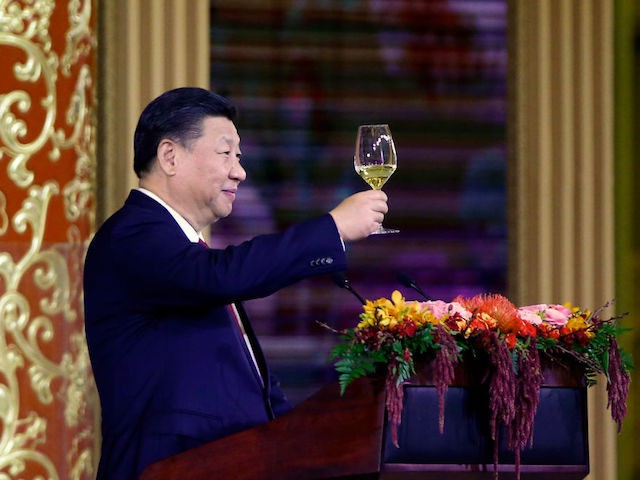China’s Communist Party (CPC) proposed removing term limits on the office of the presidency Sunday, a move that will make it easier for Communist Party general secretary, Central Military Commission chairman, and President Xi Jinping to keep all three of those titles indefinitely.
Chinese state news outlet Xinhua reported that the CPC Central Committee has introduced a series of new amendments to communist law to be debated and implemented in an upcoming session, which also included the formal addition of Xi’s totalitarian philosophy, “Xi Jinping Thought,” into the Chinese Constitution.
The constitutional amendment on term limits would change the phrase limiting presidents to two terms to: “The term of office of the President and Vice-President of the People’s Republic of China is the same as that of the National People’s Congress.”
National People’s Congress members are elected every five years, the same as the president and vice-president. Chinese law does not state that they are limited in how many times they can pursue election to seats in the congress.
Xi was elected president of the CPC in 2013 and is up for re-election this year, which experts believe he will handily achieve. During his tenure, he has pursued increasingly authoritarian policies – even within the context of the repressive Chinese communist state. Among those policies are a widespread corruption crackdown that has resulted in thousands of Communist Party members behind bars, a war on religion in which he has successfully co-opted the Chinese Catholic Church and promoted a new successor to the Dalai Lama, and an economic plan for world domination known as “One Belt One Road.”
There are indications that Chinese people who have observed an increase in repression of political speech and Western culture generally are alarmed by the possibility of an eternal President Xi Jinping. Voice of America reports that Beijing has already begun censoring discussion of the term limit removal on Sina Weibo, one of the nation’s most popular social media sites, as criticism of the move has surfaced.
The Global Times, a state propaganda newspaper, appeared ready to challenge those concerned in its commentary on the move on Sunday. “The change doesn’t mean that the Chinese president will have a lifelong tenure,” an article in the publication claimed. “Every time China deliberates on reforms and key decisions, effect on public opinion is worth pondering. Misinformation and external forces’ meddling will affect public opinion in China.”
The Global Times contends that eliminating the term limits is necessary because China is most effectively governed by “a trinity of leadership consisting of the CPC Central Committee general secretary, president of the nation and chairman of the CPC Central Military Commission.”
“To remove the two-term limit of the Chinese president can help maintain the trinity system and improve the institution of leadership of the CPC and the nation,” it concludes.
Xi Jinping, as the South China Morning Post notes, holds all those titles, and “president” is currently the weakest of the three (the other offices also do not come with term limits). Control over the CPC grants him power over domestic policy, while the commander-in-chief title grants him full control of the military.
The Global Times also argued that keeping the “trinity” in the hands of one person was particularly important because Xi Jinping is a special leader. “With Xi Jinping at the core of the Central Committee, the CPC has become stronger,” it argued. “From anti-corruption campaign to comprehensively advancing the rule of law to profound economic restructuring, the CPC Central Committee with Xi at the core has sturdily opened a new era for a hopeful China.”
“By upholding and implementing the CPC Central Committee’s decisions, Chinese society has, once and again, become the big winner in the world and strengthened its dignity in the face of the West,” the Times argued in a separate piece.
Xi Jinping made such an argument before the CPC Congress in October, his last Congress before re-election. With the United States largely absent from his epic-length three-hour speech, Xi announced that “it is time for us to take center stage in the world and to make a greater contribution to humankind.” He outlined the major tenets and proposals of “Xi Jinping Thought,” which proposed two major stages of Chinese global supremacy: a plan to build the socialist foundation of a “moderately prosperous society” between 2020 to 2035, and a plan to impose China on the world as a “great modern socialist country that is prosperous, strong, democratic, culturally advanced, harmonious, and beautiful” between 2035 and 2050.
“One Belt One Road” – a plan to have China building ports, roads, and other transport hubs on every continent, to grant China total control of global trade – is a key part of this blueprint. Xi has met stiff resistance from India, which objects to China illicitly building roads on disputed border territories, and the Trump administration, which has warned the globe that China uses “predatory” lending and economic negotiations to colonize developing economies.
Xi also promised to build a “world-class” military by 2050, to challenge American influence around the world, from Latin America to the South China Sea.
The Global Times also claimed on Sunday that keeping Chinese power “stable” as this plan is executed is necessary for success.
“Especially in the period from 2020 to 2035, which is a crucial stage for China to basically realize socialist modernization, China and the CPC need a stable, strong and consistent leadership,” Chinese professor Su Wei told the outlet. “So removal of the section of the clause about the presidency in the Constitution is serving the most important and fundamental national interest and the Party’s historic mission.”

COMMENTS
Please let us know if you're having issues with commenting.